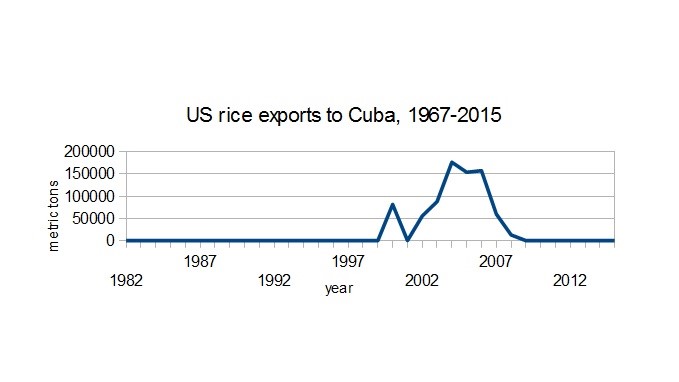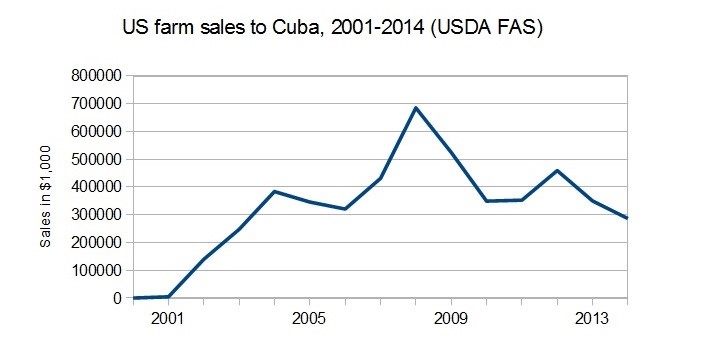WASHINGTON, Sept. 30, 2015 - Leading an entourage of 45 Arkansas agribusiness leaders and state officials to Cuba this week, Arkansas Gov. Asa Hutchinson became the first state chief executive to visit the island since President Obama's reopening of diplomatic relations with the communist nation.
Ben Noble, executive director of the Arkansas Rice Federation, says that visit, in and of itself, is significant.
 The governor served in the (George W.) Bush administration, which had a much different view on Cuba policy, and he was a part of enforcing the embargo during that period of time,” Noble tells Agri-Pulse.
The governor served in the (George W.) Bush administration, which had a much different view on Cuba policy, and he was a part of enforcing the embargo during that period of time,” Noble tells Agri-Pulse.
“We're very pleased that he's looked at the reality of the situation further and that he's changed, not only his mind, but his official policy on that issue.”
During a Sept. 29 teleconference from Havana, Hutchinson told reporters he had met with Cuba's Foreign Trade Minister and was scheduled to visit with the country's Council of Ministers.
“The fact is, we have had an embargo for 55 years; it's a reasonable step to say, 'Let's try something different,’” Hutchinson said, adding that he would like to see Congress allow U.S. exporters to compete with shippers from countries including Brazil and Vietnam by extending credit to Cuba. U.S. government requirements that sales be handled on a cash basis have restricted trade.
“Let's see the response of the government of Cuba. Hopefully, they will back off on centralized control; they will recognize the opportunities for the people of Cuba by expanded trade. Hopefully, that will translate to expanded political freedom,” he added.
Among the businesses represented on the trip is Stuttgart, Arkansas-based cooperative Riceland Foods, which is looking to reestablish a robust rice trade with Cuba.
According to a June 2015 report by USDA’s Foreign Agriculture Service, Cuba was “typically the largest commercial market for U.S. long-grain rice exports prior to the embargo, often taking more than half of U.S. annual long-grain sales . . . If Cuba imported the same amount of rice today as it did then, it would be the seventh leading destination for U.S. rice exports.”
Currently about half of the U.S. rice crop is exported, and Arkansas produced just over half the U.S. crop in 2014, according to USDA's National Agriculture Statistics Service.
Cuba had been getting some U.S. rice since Congress loosened the embargo in 2000 to allow sales of U.S. food and medicine. Between 2002 and 2006, U.S. exports to Cuba totaled about 635,000 metric tons. However, sales virtually disappeared since 2008.
Still, FAS says Cuban consumers liked the taste, appearance, and cooking qualities of U.S. rice and were willing to pay a premium for it. Long grain rice is grown in the Mississippi Delta states and remains the dominant class of U.S. rice grown for export.
Much of Cuba rice demand was met by Vietnam. Bob Cummings, chief operating officer of the Washington-based USA Rice Federation, tells Agri-Pulse Vietnam has always been in the wings as an available supplier of very low quality, low cost rice, and the Vietnamese provide credit to the Cubans on fairly favorable terms.
On the political side, he said Cuban authorities may have earlier in the century made a calculus that purchasing ag products from the United States would help in the broader effort to remove the U.S. trade restrictions.
“I don't think that worked out as they planned,” Cummings said, “So they may not see so much of a political impetus in buying from the U.S. that they once did.”
Despite the competition from Vietnam and newly ascendant South American rice exporters, Cummings thinks the U.S. could regain sales to Cuba at the levels seen in the last decade. So does Arkansas Farm Bureau President Randy Veach, who is accompanying the governor on the trip and believes sales of all U.S. farm commodities to Cuba could advance due to Obama's lowering of trade restrictions and U.S. tourism barriers.
Veach says there could be growth in Cuban import levels of grains, soy products and poultry, and tells Agri-Pulse, “U.S. beef is wanted pretty much all over the world, so I think once we have the tourism down there that beef would pick up, and pork as well.”
#30
For more news, go to www.agri-pulse.com
